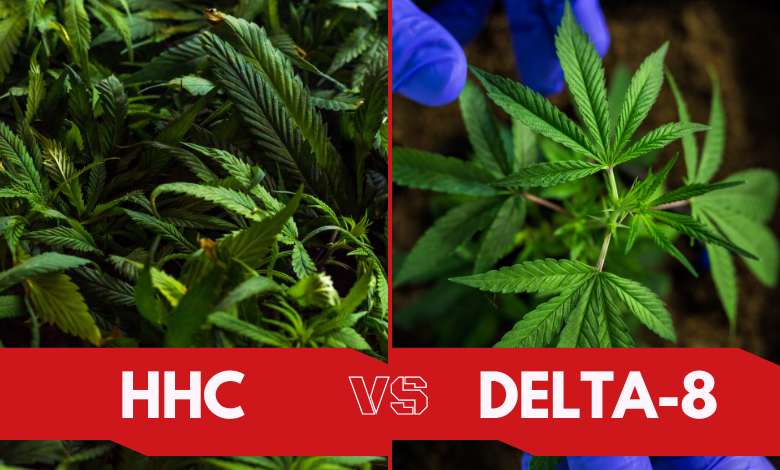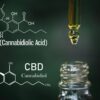HHC or Delta 8 may sound familiar to cannabis users.
HHC Vs Delta 8: What’s The Difference?
HHC and Delta-8, both present in Cannabis plants, have chemically similar structures. This leads to the same psychoactive effects as marijuana.
Cannabinoids are derived from hemp and have become a popular “legitimate substitute” for recreational marijuana, where it is still illegal.
Which one would you pick?
We’ll explore HHC vs delta, especially the differences between these cannabinoids.
Table of Contents:
- What is HHC?
- The Effects of High-Heat Coal
- Explore the Benefits and Potential Uses of HHC
- What are the side effects of HHC?
- HHC: Is it safe?
- What is Delta-8?
- Delta-8: Effects
- Delta-8 THC Benefits and Effects:
- Delta-8 THC Side Effects: What are they?
- Is Delta-8 Safe?
- HHC vs. Delta-8: Which one should I choose?
- FAQ’s
Cannabinoids and Cannabis Plants: Understanding their Interactions
The cannabis plant contains a large number of different active compounds, including more than 100 varieties. These cannabinoids affect the human body in a variety of ways.
Amongst these cannabinoids, tetrahydrocannabinol is the best-known. It’s responsible for that euphoric feeling often linked to cannabis. Cannabinol, found in large quantities in hemp plants and hemp seeds, is gaining popularity for its health benefits without producing psychoactive effects.
Cannabinoids work with the endocannabinoid (ECS) system, a regulator system that is found in every mammal. ECS is crucial in controlling many functions, including mood, pain, memory, and stress.
Researchers have noticed that cannabinoids bind specifically to receptors in the ECS and influence various biochemical reactions.
The CB2 receptors are mainly found in peripheral nerves and immune cells.
Many of the compounds in cannabinoids have antifungal or antiviral qualities.
What is HHC?
HHC is a THC derivative that has undergone hydrogenation.
Although trace amounts of HHC are found in some high-potency strains of cannabis, the majority of HHC products on the market today are semi-synthetic compounds created in laboratories by hydrogenating THC.
Roger Adams is the first person to have synthesized HHC. He replaced the double carbon bonds of THC molecules with hydrogen atoms, using the same method used in the transformation of vegetable oil into margarine.
HHC has the opposite effect of CBN, unlike THC, which degrades naturally into cannabinol.
HHC is a form of HHC that has a longer shelf life and can still bind CB1 receptors within the Endocannabinoid System (ECS), which results in similar effects to THC.
The recent popularity of HHC-based products has increased, such as edibles and vapes. These products are alternatives to traditional cannabis-derived products. HHC is derived from hemp plants that meet the requirements of the Farm Bill.
Online reports and certain companies claim that HHC is a safer alternative to THC for those who want a mildly euphoric and relaxing experience but don’t want their drug test results affected. It is also important to remember that some individuals reported they failed drug tests following HHC usage, so a guarantee of avoidance cannot be guaranteed.
The Effects of High-Heat Coal
The compounds have a similar effect since they both bind the same receptors. This results in changes in perception and modulation of appetite hormones. They also produce analgesic effects as well as relaxation.
It is the difference in potency between HHC and delta-9 THC that makes the biggest difference. Delta-9 THC is the cannabinoid most commonly found in marijuana. Although the precise degree of HHC’s diminished potency cannot be determined with precision, experts believe it is approximately 80% less potent than THC. The reduced potency of HHC reduces over-stimulation, which can lead to paranoia or anxiety.
Unfortunately, research into HHC is very limited, especially in terms of human subjects. Based on anecdotal reports from cannabis consumers, we expect similar effects as those seen with delta-9-THC products.
Let’s explore the reasons and applications for cannabis users to use HHC.
Explore the Benefits and Potential Uses of HHC
Psychoactive effects: Changes in visual and auditory perception that promote creativity, reflection, and relaxation.
Treatment of chronic pain: Interactions between TRP receptors can provide pain relief and reduce inflammation.
Potent Enhancement of Sleep: Although no studies specifically focused on HHC’s impact on sleep, online reports suggest that HHC in high doses promotes deep relaxation, possibly resulting in restful sleep.
The Potential for Relief of Nausea Symptoms. Although there is no scientific evidence to support the use of HHC in this way, the fact that it interacts with the same receptors as THC in the central nervous system suggests that HHC may be able to provide relief by regulating nausea centers within the brain.
What are the side effects of HHC?
HHC has similar side effects to THC.
- The Paranoid Syndrome
- Anxiety
- Cottonmouth (dry mouth)
- Red eyes that are dry
- Slow reaction time
- Dizziness
- Headaches
HHC is a cannabinoid that can overwhelm some people. Tolerance to cannabinoids varies depending on the individual’s body chemistry and lifestyle.
HHC: Is it safe?
HHC has a similar safety profile to THC. However, research into the safety of cannabinoids, in general, is limited.
HHC is manufactured in a way that poses a significant risk to safety. HHC does not occur in large quantities in nature, so most HHC products, such as gummies or vapes, are manufactured in labs.
Acidic chemical conversion is required to convert hemp-derived compounds in HHC. This process, when done correctly, is safe. However, insufficient manufacturing can lead to the presence of harsh chemicals and chemical solvents that are harmful if consumed in large quantities.
There are no regulations for the sale and production of cannabis-derived hemp products, as they aren’t marketed to treat medical conditions and are not FDA-approved.
Before purchasing cannabis products online, it is essential to conduct thorough research. Only engage with trusted sources who provide independent testing of their hemp extracts.
Lab tests by third parties can provide valuable information about the strength of the HHC and any contaminants. Reading online forums will also give you a better understanding of the interactions between customers and brands.
What is Delta-8?
It shares similar chemical structures but has slight differences. Only the position of the double carbon bond differs. It is on the 8th carbon chain, not the 9th. The structural differences give delta-8 THC an altered effect when compared with delta-9 THC.
Delta-8, like HHC, is found in trace quantities in raw cannabis plants. This allows for the production of products containing delta-8 by converting CBD through a chemical conversion process.
By structural isomerization, instead of hydrogenating THC, the CBD or THC molecule is converted into delta-8 THC using hydrochloric, sodium or hydroxide, or glacial acids.
Delta-8 has gained in popularity because it is a legal alternative to marijuana that allows you to get the “high” of marijuana without any potential legal consequences.
Online, delta-8 THC is more widely researched than HHC.
Delta-8: Effects
Delta-8’s milder psychoactive properties are often called “light weed,” “diet marijuana,” and “diet cannabis.” Many people prefer it as an introduction to cannabis’ psychoactive effects because its effects are less intense and have fewer negative effects.
Delta-8 THC interacts with cannabinoid receptors within the brain, which results in altered perceptions, euphoria, and relaxation, as well as changes in appetite.
Delta-8 THC Benefits and Effects:
Delta-8 has been shown to be effective in treating stress, anxiety, depression, and other mood disorders.
Delta-8 is thought to relieve pain by promoting relaxation. The CB1 receptors can also be activated to reduce pain.
Psychoactive Effects: Those seeking a milder THC experience will find a pleasant experience using delta-8. It induces a similar elevated state but without over-stimulation or negative side effects.
In murine models, low doses of Delta-8-THC have been shown to enhance food intake. Delta-8 THC’s effects may be beneficial for those with HIV or cancer therapy as well as eating disorders.
Delta-8 THC Side Effects: What are they?
Delta-8 THC is less likely to cause negative side effects, such as anxiety, which are associated with the use of delta-9.
It is thought that the safety profile for delta-8 THC and delta-9 THC is very similar, as it is non-toxic. It’s also important to remember that HHC and Delta-8 are both psychoactive substances that may affect perception and judgment. To prevent injuries or accidents, it is important to use the drug responsibly.
Delta-8 THC can cause mild side effects when consumed at high doses. You should be alert to the following side effects.
- Anxiety
- The Paranoid Syndrome
- Sleepiness
- Headaches
- Dry or red eyes
- Cottonmouth or dry mouth
- Insomnia
Is Delta-8 Safe?
Most delta-8 THC on the market today is also semi-synthetic. The delta-8 THC products are made by converting hemp-derived CBD cannabinoids into the delta-8 form through chemical reactions that involve strong acids.
The ideal method is to thoroughly remove the solvents and acids before formulating gummies or tinctures. It’s still important to be aware that some practices may not meet the standards.
It is recommended that when purchasing delta-8 THC or HHC, third-party lab tests are used to verify potency. These lab tests can provide important information on the quality of the product and help you make an informed decision.
HHC vs. Delta-8: Which one should I choose?
Both HHC and Delta-8 THC can be classified as semi-synthetic Cannabinoids. They produce similar effects to the delta-9 THC in marijuana. These cannabinoids are used as legal substitutes in areas where cannabis for recreational use is not widely available. These compounds are naturally occurring, but most products need a chemical conversion to turn CBD or THC into HHC and Delta-8.
The choice between these two products will be based on the product’s availability and desired effect. Delta-8 dominates the cannabis market today, while HHC remains a relatively young cannabinoid.
HHC is somewhere between delta-8 and delta-9 in terms of potency. Many people use delta-8-THC at night to relax and sleep.
HHC is a good alternative if you want to achieve effects that are similar to Sativa marijuana strains. It has stronger properties and can be more stimulating.
Do thorough research before making a purchase. To avoid any legal issues, it is important that you are familiar with and follow all the local laws.
FAQ’s
Is HHC stronger than delta 8?
Yes, HHC is an effective alternative to Sativa marijuana strains in terms of effects. It is more stimulating and has stronger properties.
What is the Difference between HHC and delta 8?
HHC and Delta-8 both have similar effects to delta-9 THC found in marijuana. These cannabinoids are legal in areas where cannabis recreational use is prohibited. Delta-8 THC is a strain with a good reputation as a relaxing one that’s best used in the evening. HHC, on the other hand, is more known for stimulating and stronger effects.
What is HHC?
HHC is a short form of hexahydrocannabinol. It was first synthesized in 1947 by Dr. Roger Adams. The cannabinoid THC is combined with hydrogen. HHC provides a pleasant high, which is described by many as less anxiety-inducing and more pleasurable. This is especially good for creative and social activities as it encourages positive thinking.
Is Delta 8 Safe?
It is safe to consume delta-8 THC products as long as the manufacturers use high-quality CBD.
Disclaimer – The contents of this article are provided solely for informational purposes and should not be considered medical advice. It is important to note that the information presented here is not meant to diagnose, treat, cure, or prevent any disease. Prior to embarking on any new health-related regimen, Always consult your healthcare provider before trying new supplements or treatments. Keeping you safe and well is our top priority. Additionally, it’s important to note that the FDA has not endorsed any claims regarding the health benefits of cannabis. Delta8Hub makes no guarantees or warranties regarding the accuracy, completeness, or usefulness of any messages contained here in

